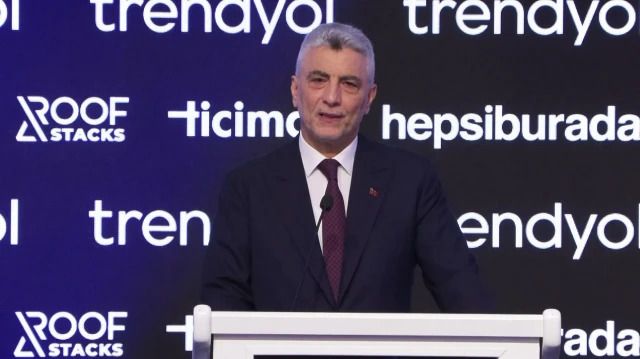Trade Ministry leads push to secure fair competition in digital marketplaces

The summit titled "The Future of E-Commerce in the Age of Artificial Intelligence," which brings together leading actors of Turkiye's e-commerce ecosystem and focuses on competition, regulation, and consumer experience in the future of e-commerce, has begun in Istanbul. Speaking at the opening of the summit organized in Istanbul under the auspices of the Ministry of Trade, hosted by the Istanbul Economic Research Association (IEAD), and in cooperation with the Union of Chambers and Commodity Exchanges of Turkiye (TOBB) Turkiye E-Commerce Sector Assembly, the Association of Electronic Commerce Operators (ETİD), and the Foreign Economic Relations Board (DEİK) Digital Technologies Business Council, Minister Bolat shared developments in the e-commerce sector.
Bolat stated that COVID-19 had a significant impact on the understanding and sudden appreciation of the e-commerce sector in Turkiye and continued his remarks as follows: "With the onset of quarantine days and months due to COVID-19, as everyone was forced to stay home and production, trade, and shopping slowed down, the e-commerce and IT sectors gained immense value—just like the health, logistics, agriculture, and food sectors. These were the shining stars of the COVID-19 era. For instance, while the e-commerce sector had a 4.5% share in overall trade in 2019, it rose to 19.5% as of last year. And it seems to have even more potential ahead."
Minister Bolat noted that due to global trade trends, businesses have increasingly embraced online channels for both domestic and international markets in recent years, and mentioned the regret felt by businesses that had not yet entered e-commerce when COVID-19 emerged. He recalled that companies which had already transitioned to online sales at that time managed to stand out and explained that today's symposium would address the future of e-commerce in terms of artificial intelligence, the necessary regulations, and the current situation. Bolat said, "I believe very beneficial outcomes will emerge from this. I hope the discussions and results here will be compiled into a report, and that we will benefit from it as well."
Minister Bolat stated that the global e-commerce volume, which was $5.5 trillion in 2022, rose to $7 trillion last year and is expected to exceed $8 trillion by 2026. He added, "When we look at our country, having a young and dynamic population, widespread use of mobile devices, the prevalence of the internet and social media, and our geographical location giving us regional power advantages all show that the horizon of the e-commerce sector is wide open and its future is bright, both nationally and internationally."
Bolat pointed out that the popularity of Turkish films abroad has indirectly influenced the preference for Turkish products and made the following assessment: "We are pleased to see that e-commerce activities are spreading in the same way. We are very pleased to see our e-export expanding even in Europe, the Caucasus, Central Asia, the Middle East, the Balkans, and Africa. But of course, we are not alone. There are very large giants, major players. Competing with them is not easy, but this development has become a new area in our foreign trade efforts. It has become a field of negotiation and agreement. We are working in consultation and coordination with you, our esteemed sector stakeholders, on all these matters. According to TÜİK data, the proportion of individuals ordering goods and services online in our country was 35% in 2020, the first year of COVID-19, and has risen to 55.7% this year. In five years, the rate of ordering via e-commerce has more than doubled."
Minister Bolat stated that Turkiye's e-commerce volume exceeded 3 trillion lira in 2024, marking a 61.7% increase compared to the previous year, and noted that this figure corresponds to $90 billion. Sharing details about this figure, Bolat said that two-thirds of total e-commerce comes from retail e-commerce.
Bolat touched on the Ministry of Trade's efforts in the field of e-commerce and provided examples of regulations implemented in this area. He shared information about the amendments made last year to the Law on the Regulation of Electronic Commerce to protect the competitiveness of Turkish producers and marketplaces globally, encourage international sales, and support high-tech investments in the sector. "Some foreign marketplaces posed a serious threat by gaining significant market share in our domestic market and potentially sweeping away domestic businesses. We wanted to prevent this," he said.
Bolat emphasized that they made changes to the regulation following this amendment and particularly took into account the complaints of sellers. Minister Bolat spoke about the support and incentives provided for international sales. He underlined that these regulations aim to increase e-exports and employment and added: "As the Ministry of Trade, we are a ministry that guides the sector, opens paths, and shapes the future shoulder to shoulder with the sector. On November 21, we will organize an e-commerce festival together with sector players and you, our valued businesses. Our goal here is to stimulate the economy and enhance economic vitality. Despite the disaster scenarios being drawn on social media, we are pleased to see that there is a positive trend and strong stability in macroeconomic indicators and all metrics. After the pandemic, wars, and earthquakes, we quickly healed our wounds. As a country, nation, and society, we are a resilient nation that reveals its true strength when faced with challenges. Whatever natural disaster or international crisis occurred, we managed to overcome each one strongly, as our President has said, and climb back toward the summit."
Minister Ömer Bolat stated that they will continue working in interaction with actors related to e-commerce and announced that awareness, promotion, and recognition trainings on e-commerce will be held in many provinces, with a total of 30 provinces planned and completion expected by early 2026. He mentioned that 60% of their budget is allocated to supporting the export of goods and services and said, "We have not forgotten e-commerce here. There is the e-Easy Export Platform. In this way, we do not forget e-commerce in promoting e-exports and other goods and services exports. We support it in the same way."
Here we are to serve you with news right now. It does not cost much, but worth your attention.
Choose to support open, independent, quality journalism and subscribe on a monthly basis.
By subscribing to our online newspaper, you can have full digital access to all news, analysis, and much more.
You can also follow AzerNEWS on Twitter @AzerNewsAz or Facebook @AzerNewsNewspaper
Thank you!

